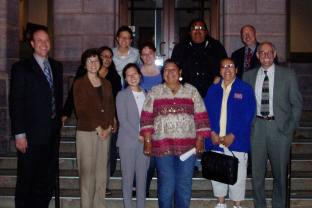Native American Families and Winner School District Announce Settlement in Case Alleging Discrimination

Representatives from the Winner/Ideal Native American community with their legal team on the steps of the federal court house in Sioux Falls on the night the settlement was reached.
LEARN MORE
> On July 12, 2007, the parties jointly submitted the attached Consent Decree to settle the lawsuit. The Court approved the Consent Decree in December of 2007. Read the Consent Decree.
> Case Profile: Antoine v. Winner School District
> Profiles of Kids at Risk - Winner, S.D.
FOR IMMEDIATE RELEASE
CONTACT: media@aclu.org
WINNER, SD - The Winner/Ideal Native American community and the Winner School District announced today that an agreement has been reached to settle a class action lawsuit brought on behalf of Native American students attending Winner schools.
"This groundbreaking settlement agreement is a major step toward ensuring that our children have the best educational opportunities possible," said Rodney Bordeaux, President of the Rosebud Sioux Tribe.
Catherine Kim, one of the attorneys for the American Civil Liberties Union representing the Native American families in this case, Antoine et al v. Winner School District, said, "Across the nation, education for Native American youth is in crisis. In Winner School District, Native American students drop out of school, transfer to other districts, or are sent to detention facilities at rates far higher than white students. We are pleased that the Winner School District has agreed to take proactive steps to support Native American students. It is our hope that the district can serve as a model for other communities serving minority students."
Rocky Blare, president of the Winner School Board, stated "Our Board spent two days in Sioux Falls, away from our families and jobs, in order to address the concerns that had been raised. Our goal was to act in the best way possible for all children of this district and move on. Ongoing litigation for years would be detrimental to our main goal of educating kids. With this settlement, we have welcomed the opportunity to provide visibility into our disciplinary policies and our cultural diversity."
The settlement arose out of a lawsuit filed in March 2006 by ten Native American families with children in the Winner schools. The court certified the suit as a class action on behalf of all Native American students in the Winner Middle and High Schools and their families. The lawsuit claimed that the schools discriminated against Native American students in disciplining them, were hostile toward Native American families, and took statements from students involved in disciplinary matters that were later used to prosecute them in juvenile and criminal courts. The school district denied any wrongdoing, but agreed to enter into settlement discussions, mediated by U.S. Magistrate Judge John E. Simko, so as to avoid time-consuming and expensive litigation.
Under the settlement agreement reached by the parties, the district will enact policies and practices to ensure that the rights of Native American students are not violated and to enrich the educational experience of all students. Among the key terms of the settlement are the following:
- School officials will not require students to write statements that can be used to prosecute them in juvenile or criminal court;
- The district will hire a full-time ombudsperson, nominated by the collective Native American community, to serve as a liaison between Native American families and school officials, especially on disciplinary issues;
- An educational expert will work with school officials and Native American families to set benchmarks on improving Native American graduation rates, reducing levels of suspension and school-based arrests, and improving the overall climate for Native American students, among other goals; the expert will also conduct periodic on-site visits to ensure compliance with the agreement and monitor progress toward the goals;
- A committee of Native American parents and school officials will review all disciplinary incidents every quarter for racial disparities and, if disparities are found and cannot be explained, recommend policy changes to reduce such disparities;
- The Interwest Equity Assistance Center, funded by the U.S. Department of Education, will provide trainings for Winner students on conflict resolution and trainings for teachers on unconscious racial bias and educational equity;
- The schools will include Native American themes in the mainstream curriculum, in-school activities, and after-school activities. Additionally, the district will offer Native American Culture, History and Language class every year in the high school, taught by a Native American instructor.
Participants in the mediation included Native American families named in the class action lawsuit, members of the Winner School Board, the superintendent, and two school principals. The families were represented by the national ACLU and the ACLU of the Dakotas, and Dana L. Hanna, an attorney based in Rapid City. Additionally, the Rosebud Sioux Tribal Council and the Rosebud Sioux Tribal Education Department provided assistance and facilitation. The Winner School District was represented by Gunderson, Palmer, Goodsell & Nelson, LLP, in Rapid City.
The settlement agreement will remain in effect until the district substantially complies with its terms for four consecutive years. The federal district court will have jurisdiction over the agreement during this period. The parties will be submitting a proposed consent decree to finalize the settlement, and the court will next consider any objections and decide whether to approve it.

